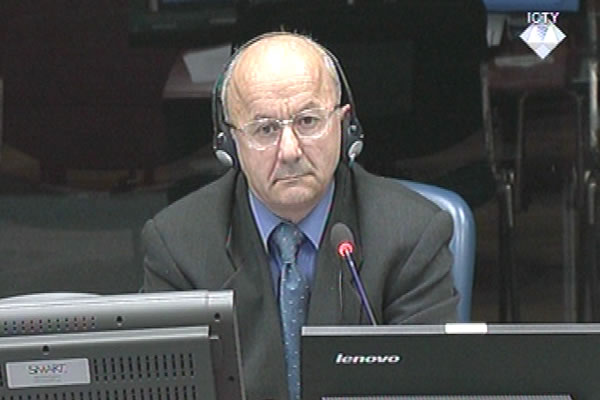Home
‘NO ONE TOUCHED MUSLIMS IN KLJUC’
In his evidence in Ratko Mladic’s defense, Bosnian Serb military officer Velimir Kevac claimed that the Serb authorities protected Muslims in Kljuc during the war. According to Kevac, Muslims were able to live in peace, and were not exposed to any pressure. Military action was taken only against those Muslims who had refused to surrender their weapons, Kevac explained
 Velimir Kevac, defence witness at Rako Mladic trial
Velimir Kevac, defence witness at Rako Mladic trial According to the indictment against Ratko Mladic, Kljuc is one of the municipalities where genocide was committed against non-Serbs. A wide range of crimes were committed in Kljuc, including mass murder, unlawful detention and destruction of religious buildings. Today’s defense witness Velimir Kevac contested those allegations. From May 1992 to October 1993, Kevac served as the assistant to the commander of the VRS 30th Division. He was later appointed commander of the Kljuc Brigade. According to the witness’s statement and his examination-in-chief, the situation in Kljuc during the war was peaceful with occasional incidents caused by the Muslim side.
Kevac claimed that in late May 1992, a JNA brigade was attacked as it was pulling out. The incident happened near Kljuc and ‘prompted an action’ against ‘Muslim extremists’. They were headed by Omer Filipovic. After ‘several warning shots’ from the Serb positions, Filipovic agreed to surrender arms. Some of the men from Filipovic’s Territorial Defense refused to do so and a ‘search and mop-up’ operation was launched to deal with them.
In his statement, the witness claimed that the non-Serbs enjoyed protection and that ‘no one expelled them’. There were 49 per cent of Muslims in the town and they ‘were able to live in peace’. No one touched them and their safety was guaranteed as long as they agreed to hand over their weapons, Kevac noted. Military action was taken against those who refused to do so.
As alleged in the indictment against Mladic, in early June 1992, seventy-seven Muslims from the Kljuc area were killed in the school in Velagici. As he was questioned by defense counsel Ivetic, the witness said that he had heard about the incident. After the crime, the military police carried out the crime scene investigation and the perpetrators were arrested, Kevac explained. However, the witness failed to specify if the perpetrators were prosecuted.
In the first part of the cross-examination, prosecutor Edgerton put it to the witness that in late May 1992, after the attack on the JNA column, there was a retaliatory attack on the Muslim villages. About 900 Muslims were detained. Kevac responded that he didn’t know the exact number of the Muslims who ended up in detention, but he was sure that all those who had surrendered or had been captured in combat remained under the jurisdiction of the civilian police, not the army. Thus the witness shifted the blame for the victims’ eventual fate from the units subordinated to the accused on the Serb civilian authorities. Kevac likewise dismissed the suggestion that the army had handed over the prisoners to the police. When the prosecutor put it to him that the police were often subordinated to the military units, Kevac explained that the higher command would make those decisions.
Mladic’s defense counsel Ivetic was cautioned for raising frequent objections during the cross-examination, as the judges considered them to be groundless. Velimir Kevac will complete his evidence tomorrow.Linked Reports
- Case : Mladic
- 2015-01-20 WAR CRIMES COMMITTED BY 'OUT OF CONTROL INDIVIDUALS'
- 2015-01-19 WHY AND WHEN DID MUSLIMS LEAVE PRIJEDOR?
- 2014-12-18 HEAD OF MLADIC’S INFORMATION SERVICE CLAIMS HE DID NOT RECEIVE INFORMATION
- 2015-01-23 ‘PROTECTION’ OF MUSLIMS IN KLJUC
- 2015-01-23 GENERAL MLADIC’S ‘FLOWER GARDEN’
- 2015-01-26 AUTHENTICITY OF INTERCEPTED CONVERSATIONS CONTESTED
